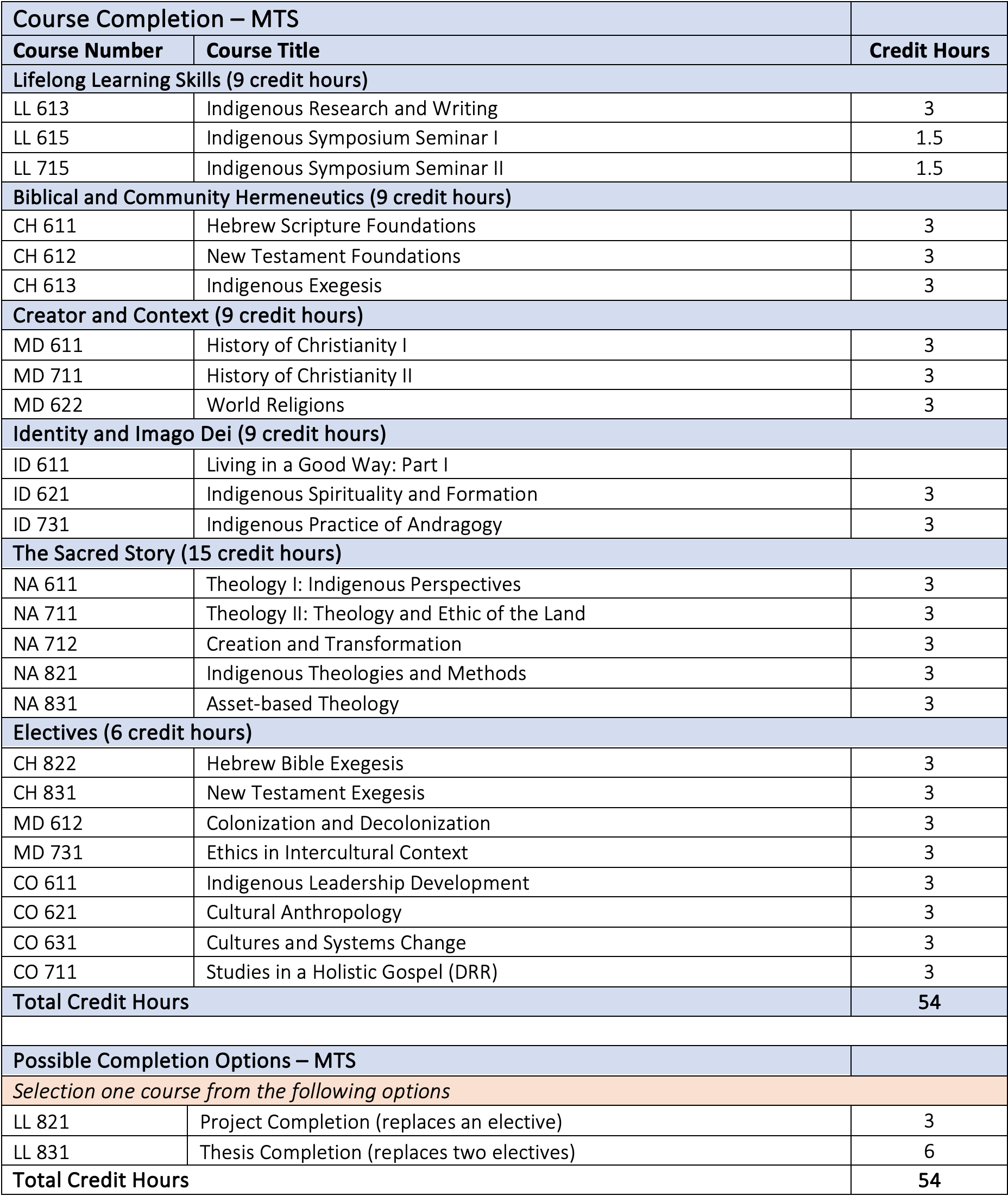Master of Theological Studies (MTS)
For a full overview of the program offerings and course descriptions, please refer to the 2024-25 Academic Handbook
The MTS graduate theological degree is designed to introduce the learner to a multidisciplinary understanding of Indigenous theology, history, and praxis. The goal is to encourage individuals and their communities of faith to fully embrace being Indigenous followers of Jesus Christ. In so doing, the program aims to prepare students to assist their community in following God’s call. Throughout the program, students will learn how to fully engage their ministries within their Indigenous contexts.
54 Credit Hours earns you a Master of Theological Studies
You will study with some of the finest Indigenous practitioners and scholars in the global context – women and men with earned experience to accompany the academics.
- Majority Indigenous faculty
- An Indigenous designed curriculum
- Course delivery with Indigenous methods
Courses include
- Biblical Interpretation
- New Testament Foundations
- Indigenous Theologies and Methods
- Missional Ecclesiology
- History of Christianity: Indigenous History and Mission
This is a non-resident degree. Face-to-face time is during three weeks at the Annual NAIITS Symposium. Community is built through time in study cohorts, one-to-one mentorship with faculty and the Field Placement.
As we navigate places where we don’t see ourselves...
MA in Theological Studies
Fees for North American Programs
| Program Application Fee * | Applicant resident in Canada Applicant resident in US or elsewhere |
$CAD 50 $USD 50 |
| Tuition per three credit hour course ** | Student resident in Canada Student resident in US or elsewhere |
$CAD 1000 $USD 1000 |
| Audit Fee per course ** | Auditor resident in Canada Auditor resident in US or elsewhere |
$CAD 500 $USD 500 |
* Application fee payable with on-line application.
** Tuition and audit fees payable at the time of course registration.
Course tuition includes library and technology costs.
Costs associated with attendance at the two required NAIITS Symposium events (registration, travel expenses, accommodation, and meals) are not included in course tuition. All costs remain the responsibility of the student.
Curriculum Philosophy
After years of work and planning by Indigenous leaders experienced in theology and mission, NAIITTS has produced an andragogical (adult-focused) methodology that allows us to more effectively serve Indigenous persons admitted to the program.
Each academic year, a proportionate number of non-Indigenous students may be admitted to the program on a case-by-case basis.
Transfer Credit
Transfer of up to 27 hours of credit from accredited graduate schools is permitted into this program. Students must have achieved a grade of B- or higher for a course to be considered for transfer. In addition, only courses taken elsewhere within ten years of matriculation in this program will be considered for transfer. Transferability of credits earned in this program to another institution is at the discretion of the receiving institution. Any request of transfer of credits must be made at the time of application/admission.
Faculty
Indigenous academic leaders have designed and tailored this degree for Indigenous people and those serving in indigenous communities. More than 80% of professors in the program are Indigenous scholars and practitioners with doctoral degrees from a wide range of universities and seminaries. Students will learn from professors who are engaged in their own Indigenous communities and are committed followers of Jesus. The NAIITS faculty are passionate about providing graduate-level theological education for Indigenous individuals and communities.
Accessibility
Courses are available in flexible, accessible formats. Online-hybrid options allow students to live in home community. Intensive summer courses provide face-to-face classroom experience. Wrap-around conference courses related to the NAIITS Annual Symposium stimulate learning. Elective courses allow students to further tailor the program to their own learning and ministry environment.
Mutual Learning Community
Students will join with colleagues who are working in Indigenous contexts and will grow in leadership capacity as relationships are built. The program will provide one-to-one experiences and small-group mentorship.
Further details may be found in the Student Handbook and annual Academic Calendar which can be requested from admissions@naiits.com

Scholarship Application
While not guaranteed, NAIITS attempts to offer a tuition-directed scholarship for the MA program(s), which is made available through the generosity of faculty and friends. If you believe you might qualify for the scholarship, you are encouraged to apply according to the following guidelines.
BASIC AWARD
$100 per credit hour taken per award period deemed eligible to a maximum lifetime
award of $5000.
Requirements for Consideration
- Scholarship awards are directed primarily toward Indigenous peoples. Non-Indigenous students may apply and be considered, but will not be guaranteed.
- Scholarships will be awarded solely at the discretion of NAIITS faculty and/or administration, which may make other awards as deemed appropriate.
- Students must be enrolled or accepted into one of the NAIITS degree programs.
- Students must be enrolled full time in two consecutive semesters for the year in which the hours per semester.
- Students must reapply for scholarships each year. NOTE: Subsequent withdrawal from courses given will disqualify the applicant from reapplying for one full year.
- Applications must be received by March 1st to be considered for the April 30th awards and by July 1st to be considered for the August 30th awards respectively.
- Students who are applying for other student aid in their country of residence must complete and file required documents personally – they will not be filed by NAIITS.
NOTE: Successful applicants are not prevented from applying for scholarships from other sources of funding.
Download the Scholarship Application form here
For more information contact admissions@naiits.com
Applicants whose first language is not English will be required to provide documentation of their capacity to study in English.